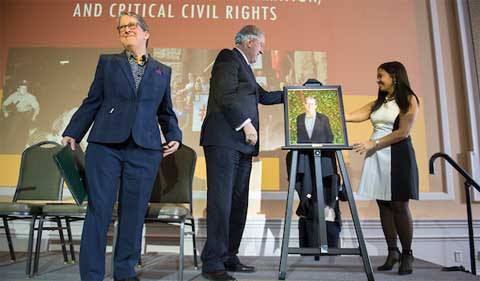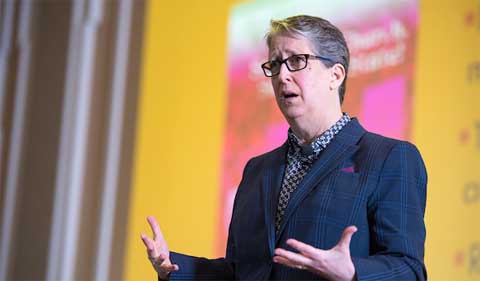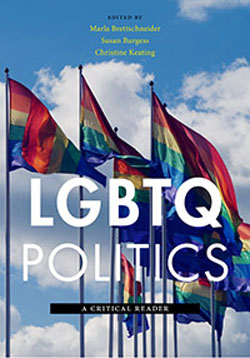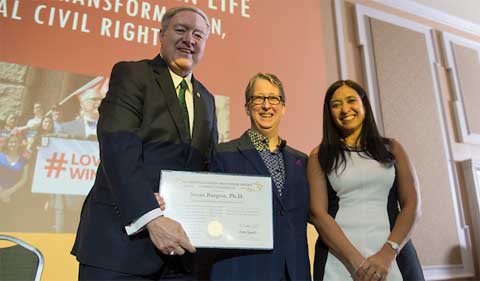Original story by Alaina Bartel, photos by Hannah Ruhoff
From Compass
“I accept the honor tonight and we celebrate it together, for all of the women, all of the gay people, all of the LGBT people who have worked so hard to produce important research here at OHIO,” said Dr. Susan Burgess, the first woman in the College of Arts & Sciences to be named a distinguished professor, and the first gay person, to her knowledge. “And for everyone who has worked to make OHIO a more welcoming and inclusive place over the years.”
“We typically honor individuals, but we all know that good work really takes places in communities,” said Burgess during a Portrait Unveiling and Distinguished Professor Lecture on Feb. 25 in the Baker University Center Ballroom. “It sees the light of day only because creative people working together challenge orthodoxies and make ideas that once seemed heretical more visible, more known — eventually, even more accepted.”
The Distinguished Professor Award recognizes outstanding scholarly and creative accomplishments and is the highest permanent recognition attainable by faculty at Ohio University.

Dr. Susan Burgess, left, President M. Duane Nellis, middle, and Dr. Gerri Botte, right, get the first look at Dr. Burgess’ Distinguished Professor Portrait.
When Burgess first received the personal email from Ohio University President M. Duane Nellis that relayed he had some exciting news for her, she said she was not used to receiving personal emails from the president.
“I thought it was spam at first,” she joked.
Burgess soon learned that Nellis did indeed have some big news to share — she had been selected as Ohio University’s 2018 Distinguished Professor.

During her lecture, Dr. Burgess spoke about how LGBT life has changed over the years at OHIO and in the United States.
Following the portrait unveiling, Burgess presented her lecture, “LGBT Inclusion in American Life: Pop Culture, Legal Transformation, and Critical Civil Rights.”
Burgess spoke about how LGBT life has changed over the years at OHIO and in the United States, a topic she discusses in her new book LGBTQ Politics: A Critical Reader, co-edited with Marla Brettschneider (University of New Hampshire) and Christine Keating (University of Washington).
 “Mainstream political science has been able to show a remarkable increase in acceptance of LGBT rights in recent years,” she explained. “But it has not been able to fully explain how and why is has occurred. In part, that’s because of the relatively rapid place in which this change seems to have taken place.”
“Mainstream political science has been able to show a remarkable increase in acceptance of LGBT rights in recent years,” she explained. “But it has not been able to fully explain how and why is has occurred. In part, that’s because of the relatively rapid place in which this change seems to have taken place.”
Burgess explained toward the end of her lecture that large cultural shifts in pop culture can be linked to broader changes in public understanding of a variety of complex factors that aren’t obviously related to LGBT issues.
“Rather than allowing our political imaginations to be stuck in whatever’s in front of us in any given political time, let’s commit ourselves, right now, to always expanding our imaginations to produce, to see, to embrace more just, more inclusive, more democratic radical futures,” Burgess said.
“Especially those that seem improbable in our current political time, because, if we are fortunate,” she continued, “those visions may not seem radical at all in the not so distant future, as what we expect of mainstream politics, as what we desire, is transformed right before our eyes.”

President M. Duane Nellis and Dr. Gerri Botte commemorate Dr. Susan Burgess, middle, on her status of Distinguished Professor.
Among the privileges granted to distinguished professors is the lifetime designation title of distinguished professor, a one-quarter paid research leave, stipend and travel support. Additionally, distinguished professors have the honor of annually naming an undergraduate student to receive a year’s full-tuition scholarship.
The first student Burgess presented the scholarship to was present at the event to support Burgess, as were dozens of her friends, family members and colleagues.
“I am honored to be here with all of you tonight as we celebrate Dr. Burgess, who embodies the kind of innovative research and outstanding scholarship for which Ohio University faculty members are celebrated,” Nellis said.
Dr. Gerri Botte, chair of the nominations committee and a distinguished professor herself, introduced Burgess, saying her work in the areas of law and courts, politics and sexuality, popular culture, and radical politics has prompted scholars and professional associations to redefine and expand the boundaries of mainstream political science and interdisciplinary legal studies.
“Professor Burgess has written, edited and co-edited five books — see her collection over there,” Botte said, gesturing to a display of books, “that have been adopted by libraries in over 70 countries worldwide.”



















Comments